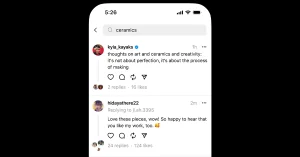Key Highlights
- Threads has about 100 million users.
- The microblogging platform is not expanding the keyword search feature to all markets.
- The feature was under testing in the US, Australia and New Zealand.
X’s (formerly known as Twitter) biggest rival Threads is giving it a tough fight. And now to stay ahead of the competition it has come up with a new feature on its platform. The microblogging site owned by Meta is expanding its keyword search feature to all its users. The Threads feature was under testing in a few markets and is now being expanded to all regions. Also earlier it only supported English and Spanish language but will now be supported in all languages.
The keyword search feature on Threads is now being expanded. Meta’s Chief Mark Zuckerberg via Threads announced the upcoming feature for all its users. He said, “Get excited — search is coming to Threads.” He further added, “Rolling out to most English and Spanish speaking countries today. More to come soon.”
On the other hand, Instagram Head Adam Mosseri also confirmed about the forthcoming Threads feature. He confirmed more enhancements will come to the search action soon although he did not specify which features would be included.
He stated, “Today, we’re expanding keyword search everywhere Threads is available. This feature is supported in all languages – we hope this makes it easier to find and join conversations you’re interested in. More improvements are coming to search soon, let me know in the replies if you have feedback.”
For those who are unaware, the keyword search feature on Threads was first made available in Australia and New Zealand in August even before it was rolled out in the United States, in September.
Recently Threads released the option to delete Threads profile without deleting Instagram account altogether. To delete Threads Go to Settings → Account → Delete or Deactivate Profile, then select delete.
It also rolled out the feature tags just like hashtags. The Threads Tags are based on theme or area of interest, indicating that they will function similarly to Twitter hashtags but without a hash.




